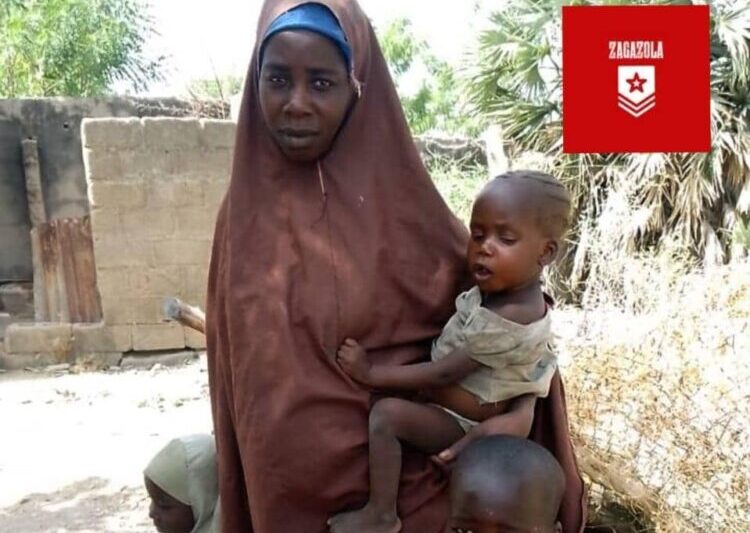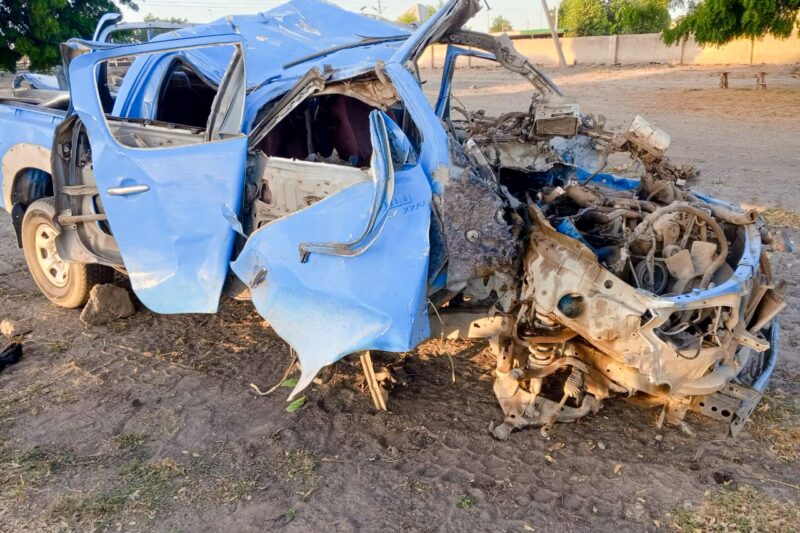Two young women, who were among the 276 Chibok schoolgirls abducted by insurgents eight years ago from the Government Girls Secondary School, have been found.
The Nigerian Army confirmed on its official Twitter account that troops of the 26 Task Force Brigade, who were patrolling areas around Ngoshe village in the Gwoza Local Government Area of Borno State, found the first young woman, Mary Ngoshe, on Tuesday, June 14, exactly eight years after the girls were abducted by the Jamā’at Ahl as-Sunnah lid-Da’way Wa’l-Jihād (JAS), better known as Boko Haram, in 2014.
On Friday, June 17, the military announced it had rescued another Chibok schoolgirl, Hauwa Joseph, now a young woman, who was found with her young son.
There are still more than 100 girls missing.
The army is holding the young women, who have yet to be reunited with their families.
Allen Menesseh, director of media and communication of the Kibaku Area Development Association, told RNI that the socio-cultural organisation was told that the two young women were free at last.
But, he said, there had been some confusion about Mary Ngoshe because her name was not on the list of the missing girls.
“Luckily, we took her picture – uploaded from the army’s Twitter site – and showed it to some of the parents whose daughters are still missing. One of the mothers confirmed that Mary was her daughter. She was quite emotional and cried when she saw the picture. Although still to be reunited with her, the mother was excited and relieved that her daughter was still alive and now safe. She cannot wait to see her again.”
Menesseh said there was a communication gap between the army and the parents and guardians of the abducted girls, which sometimes made it difficult to confirm their identities. It was a problem because it created confusion and sometimes false hope for the parents, who were desperate and wanted to know where their daughters were and whether it was their daughter who had been rescued or someone else’s.
“There is a lack of communication between the Nigerian Military and the community. They do not know where parents and guardians or relatives of the abducted Chibok girls live. The military needs to communicate, inform and liaise with the parents of the abducted girls. They need the local community to identify the names of the girls, as well as the whereabouts of their parents, to avoid confusion, misinformation and misunderstanding,” he said.
“For example, when I heard that Mary Ngoshe had been found, I knew that there was no Mary Ngoshe among the names of the missing girls. The only Mary I was aware of was Mary Dauda. There are many girls whose names are either Mary or Elizabeth. That’s why we thought that the military had mistaken Mary Ngoshe for Mary Dauda.
“And that’s why, whenever these abducted Chibok girls are rescued or found, we always ask the military to allow us to speak to them, so that we can detailed information, including their identities, but also about their health status before reuniting them with their parents, guardians or relatives. The military should contact our organisation first because we are very close to the parents and families. We also know their names and location, as well as other classified information. If the military liaises with us, we can help them to identify the girls and find their loved ones without any difficulty.”
Menesseh said: “When I heard that Mary Ngoshe was found, I went straight went to Mary Dauda’s home in Askira-Uba to look for her parents. Her mother was not at home but I learnt that, if the young woman was Mary Dauda, her father had died just last week. Her mother is still alive but she doesn’t know anything about her daughter and she doesn’t own a cellphone. Parents who live in remote villages do not get any information about their children, unless they hear it from us, community members or traditional leaders. It is imperative that the army contacts local community members so that the girls can be identified immediately and returned to their parents, guardians and relatives as soon as possible.
“Some time back, some Chibok girls were rescued and kept in a government facility or camp in Maiduguri for almost nine months before they were reunited with their families. This is ridiculous. The girls should be reunited with their love ones as soon as possible,” Menesseh said.
“Right now, these two rescued Chibok girls, Mary Ngoshe and Hauwa Joseph, are under military custody and have not been reunited with their parents or families. We urge the military to reunite these young women with their parents or families, even if it is only virtually, via a video call or some other means of communication. This will bring some relief for both the young women and their families.”
He said the military needed to come up with a policy that would include local community members, as well as parents and guardians, to help the young women who might need rehabilitation and psycho-social support.
When other parents heard that two of the girls had been found, they immediately started praying that one of them could be their daughter.
Rachel Daniel, whose daughter is still missing, told RNI that it was time for the government to take “decisive measures to rescue the rest of the abducted Chibok girls”.
“When we heard that the two young women had been rescued, we became so elated and excited. We waited patiently to hear that the remaining girls had also been rescued. But, unfortunately, we did not get that good news.”
Daniel said the parents and guardians of these kidnapped Chibok girls were still traumatised by what had happened to them. Some had fallen ill and some had even died.
“When we lost our girls, some people understood our trauma and the worry associated with it. But some people were very unkind. Some even insulted us by saying we had sold our daughters to Boko Haram. What nonsense. I say to them: ‘Show us the evidence.’ People can be so mean.”
Daniel said some people insulted them in the “morning, afternoon and evening. People should fear God. What we are going through is not by our choice. But we believe that it’s a destiny from God. That’s why we have left it in God’s hands.
“Everyone knows the pain of miscarriage. Imagine what it feels like to have brought up your children with so much care and love and then suddenly someone steals them from you. How can anyone pacify themselves when this happens?” Daniels said.
“Therefore, I’m begging Boko Haram insurgents to have pity on us and release the remaining missing girls. We have suffered a lot. These insurgents have killed our beloved ones, destroyed our houses and property and displaced many people. Isn’t that enough? But it seems not. They are still holding our daughters captive. Why? What for?”
Daniels said the government had to do something to get their daughters released, “even if it means they will have to negotiate with Boko Haram”.
She said many parents were grateful to the government for facilitating the release of some of the abducted school girls.
“But it’s not proper to rescue half and leave half captive. Whenever, we talk about our missing daughters, the government tells us to be patient. I don’t know what that means. Do they want us to die before our daughters are returned to us?”
- On the night of April 14 – 15 in 2014, 276 mostly Christian girls aged between 16 and 18 were abducted during a raid on the Government Girls Secondary School in Chibok by the JAS.
Before this, the school had been closed for about four weeks because of growing security concerns. However, these girls had returned to the school to write their final exams.
During the attack, 57 girls escaped by jumping off the trucks on which they were being transported. Over the years, some had been rescued and others had escaped. A few had even been killed. More than 100 were still missing.
The abduction sparked global outrage and a campaign − #BringBackOurGirls – was established.
SHETTIMA LAWAN MONGUNO








